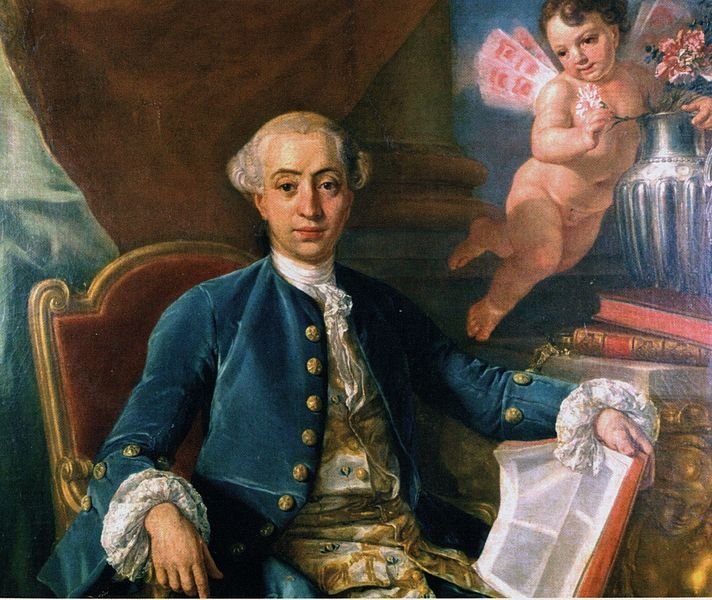Giacomo Girolamo Casanova, a man whose name has become synonymous with womanizing, spent his final years and composed a rich autobiography in Bohemia. While there, he met figures such as Mozart and became a librarian at Dux Chateau in Count Waldstein's household. His life there was impactful enough to inspire Casanova in Bohemia, a book by Andrei Codrescu.
Giacomo Casanova, by Raffaello Menges
Casanova’s Life and Background
Drawing by his brother Francesco
The story of Casanova begins in Venice, Italy, where he spent his childhood. At the time, Venice was a thriving cultural center with attractions such as the Carnival and gambling houses. Casanova would spend his teenage years living with Abbé Gozzi, an instructor at the boarding school he was sent to. It was there he had his first romance, with the daughter of Gozzi.
Casanova was able to graduate with a degree in law at the age of 17, but he had no passion for the field. His true passion rested with medicine, but it was the Abbe’s wish that he become an ecclesiastical lawyer. While in university, Casanova developed a habit of gambling, one that remained even after he returned to Venice and led to debt and later imprisonment.
Upon his return to Venice, Casanova started his clerical law career, became an abbe, and continued to attend university. He found his first patron, who taught him about good food, wine, and societal expectations. This relationship lasted until Casanova seduced a woman his patron desired, and he was kicked out of the house. Casanova’s interest in women would only increase after that, with an encounter with two sisters cementing his “life avocation” of seduction.
Casanova’s church career was tainted by scandal, and he later became a solider, a professional gambler, and then a violinist. After saving the life of a Venetian patrician of the Bragadin family, the man became his lifelong patron and Casanova spent a while as a nobleman, indulging in his vices. Shortly after, he fled Venice due to scandal and became enamored with a Frenchwoman named Henriette, one of his greatest romances.
After his romance ended, Casanova went on a Grand tour, becoming a freemason and having elaborate romances. Upon his return to Venice, he found himself in more scandals and was arrested for affront to religion and common decency. He managed an escape and traveled to Paris.
In Paris, Casanova found fortune and seduction, mesmerizing aristocrats with his “occultism,” which was actually created by Casanova’s remarkable memory. He claimed to be a Rosicrucian and an alchemist, and gained favor with the nobility. Casanova became a spy for a short while and determined the necessity of a revolution in France. His scandals eventually caught up to him again, and he was forced to flee, facing imprisonment along the way. He met figures such as Albrecht von Haller and Voltaire and began calling himself the Chevalier de Seingalt.
In England, Casanova met King George III along with many mistresses. He attempted to sell his lottery scheme to the King and later to other governments and political figures, including Frederick the Great and Catherine the Great. He quickly became known across Europe for his reckless behavior.
Casanova’s Time in Bohemia
French School, 18th Century; Portrait of Giovanni Giacomo Casanova
After a long series of troubles, Casanova traveled to Bohemia and became the librarian for Count Joseph Karl von Waldstein, a chamberlain of the emperor, in the Castle of Dux. Though he had visited Prague during his travels, he found the environment too morally strict and an inadequate place to practice his vices. As he aged and was reduced to scandal and financial struggles, Bohemia became a more fitting home. According to historian Jakub Mracek, "Casanova's job was to do some system in this huge library, but he did nothing. All the years in Duchcov, he only wrote his books and his correspondence."
“Prague is a Gothic city that was baroquized by Italian artists,” according to Milos Curik, a Czech cultural guide. “This was where the Italian Renaissance first reached northern Europe.” These features made Prague a fine destination for a Venetian. Casanova made many trips to Prague and met Wolfgang Amadeus Mozart. He is even said to have worked on the libretto of Don Giovanni, a grand opera about a womanizer who was loved by women until his amoral vices caught up to him. This claim is supported by circumstantial evidence and notes found after Casanova’s death in 1798. He also witnessed the coronation of Emperor Leopold II in 1791. However, most of his time in Bohemia was less exciting.
While working as a librarian, Casanova was disliked by guests and ignored by the Count. His fame had finally faded and he lived a quiet, impotent life. Though he struggled with suicidal ideation, he wanted to finish his memoirs before his death. His last words are said to be "Great god and all witnesses of my death: I have lived as a philosopher and I die as a Christian."
Written by Jaime Johnston
“Giacomo Casanova.” Wikipedia, June 16, 2023. https://en.wikipedia.org/wiki/Giacomo_Casanova.
Kenety, Brian. “Casanova: The World-Class Lover Who Died a Second-Rate Librarian in Bohemia.” Radio Prague International, April 8, 2021. https://english.radio.cz/casanova-world-class-lover-who-died-a-second-rate-librarian-bohemia-8098375.
Magazine, Smithsonian. “When Casanova Met Mozart.” Smithsonian.com, March 21, 2012. https://www.smithsonianmag.com/travel/when-casanova-met-mozart-163068912/.
“Mozart’s Don Giovanni – A Quick Synopsis: Opera Atelier.” Home, October 17, 2019. https://www.operaatelier.com/post/mozarts-don-giovanni-a-quick-synopsis.



